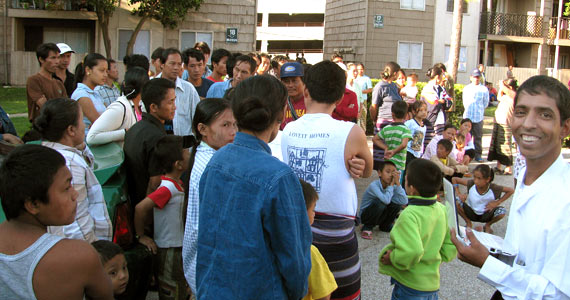
Burmese refugee John Glenn, far right, was resettled in January in Houston, where he tries to help his other refugees in his apartment complex navigate a new world. (Mike Giglio / The Salt Lake Tribune)
By Kristen Moulton | The Salt Lake Tribune
John Glenn has a quintessentially American name, but he’s not feeling so proud of his adopted country after nearly a year here.
Born in Burma, now Myanmar, in 1969, just days after Apollo 11 put the first men on the moon, Glenn was named by his mother for an astronaut who wasn’t on the mission -- but was the first American to orbit the Earth.
He became an activist and was jailed for protesting Myanmar’s government. Since his resettlement in Houston in January , he has felt isolated, confused and frustrated, and has watched fellow refugees, who lack his fluency in English, flounder even more.
“If the situation here is not improved, I don’t want any refugees to come in here,” said Glenn, who works in purchasing for a Houston motel.

Glenn feels resettlement agencies communicate poorly with refugees, showing little compassion for their struggles. “They accepted the government proposals to take care of the refugees,” he said, “but they didn’t take care of the refugees.”
He recalled taking meat donated by a volunteer group to a new Karenni refugee who had moved into his apartment complex.
“When he received the meat, he asked me, ‘Where is the rice?’ I was shocked. I said, ‘Call the agencies,’ ”Glenn said. “He said, ‘I’ve been calling them for three days, and I don’t know where to buy the rice. I don’t have the money.’”
He offered another example: Eight refugees tried out for a job one Friday in early November. When a resettlement agency driver returned them home, he didn’t tell them whether they’d been hired, Glenn said.
On Monday morning -- before dawn -- Glenn found one of the men waiting outside for a ride to work. The ride never came; the man later learned none of the eight had been hired.
“We understand the situation of the economy,” Glenn said. “But a little bit of social caring ... it’s still needed.”